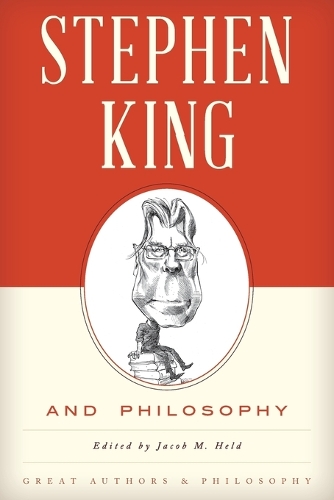
Stephen King and Philosophy
(Paperback)
Publishing Details
Stephen King and Philosophy
By (Author) Jacob M. Held
Bloomsbury Publishing PLC
Rowman & Littlefield Publishers
15th August 2016
United States
Classifications
Tertiary Education
Non Fiction
Literary studies: c 1900 to c 2000
Literary studies: fiction, novelists and prose writers
Popular culture
128
Physical Properties
Paperback
328
Width 151mm, Height 226mm, Spine 18mm
435g
Description
Haunting us with such unforgettable stories as The Shining, The Shawshank Redemption, Salems Lot, Carrie, The Green Mile, and Pet Sematary, Stephen King has been an anchor of American horror, science fiction, psychological thrillers, and suspense for more than forty years. His characters have brought chills to our spines and challenged our notions of reality while leaving us in awe of the perseverance of the human spirit. The first book in the new Great Authors and Philosophy series, Stephen King and Philosophy reveals some of the deeper issues raised by Kings work. From retribution, freedom, and moral relativity, to death and insanity, the chapters of this book expose how Kings stories access the questions and fears that haunt each of us in the middle of the night. Contributions by Katherine Allen, Randall E. Auxier, Charles Bane, Matthew Butkus, Kellye Byal, Cam Cobb, Timothy Dale, Paul R. Daniels, Joseph J. Foy, Bertha Alvarez Manninen, Tuomas W. Manninen, Garret Merriam, Michael K. Potter, and C. Taylor Sutton
Reviews
Author Stephen King, despite his popularity, is largely derided in academic circles, typecast as a genre-fiction horror novelist. In this collection of essays concerning different philosophical views as they relate to Kings work, Held argues that horror is the perfect category in which philosophy can thrive because it forces readers to be aware of things hidden deep and dark within our basest selves. What we fear goes a long way toward defining us as people, and King has always been well known for tapping into these anxieties and exploiting them in his writing. It is refreshing to see King finally viewed through a scholarly lens, with pieces on topics such as reading The Dark Tower as a nihilistic text, using Carrie to discuss the definition of womanhood as 'Other' in a male-centric society, and Aristotelian friendship in The Body and Rita Hayworth and Shawshank Redemption. VERDICT Kings 'Constant Readers' will rejoice in this appreciation of their academically misaligned hero; students of philosophy, collegiate or casual, will also enjoy this text, giving them a familiar context to a field that can confuse the best of us. * Library Journal *
"A splendidly stimulating anthology that delves deep into the treasures of Stephen King's work and brings back riches we may not have noticed. Challenging and searching, these essays are fun to read too. Like all the best criticism, they send us back for a fresh look at the original." -- Ramsey Campbell, author of The Grin of the Dark and The Kind Folk
"The worldaround us is chock full of philosophical issues. So is the compelling fiction of Stephen King, which is part of its allure. The essays in this book raise those issues and discuss them well, often even brilliantly, using his stories to unearth major philosophical questions that allthoughtful people should pursue. Highly recommended for King fans and anyone interested in philosophy!" -- Tom Morris, bestselling author of If Aristotle Ran General Motors, The Stoic Art of Living, The Oasis Within
"Stephen Kings work finally gets its philosophical due. Drawing on thinkers from Aristotle to Nietzsche, this book sheds light on complex issues like the nature of evil while revealing hidden depths of horror and insight." -- William Irwin, King's College, Pennsylvania
Author Bio
Jacob Held has written extensively on philosophy and popular culture, having edited Dr. Seuss and Philosophy and Roald Dahl and Philosophy, coedited James Bond and Philosophy, and contributed to volumes on the Beatles, South Park, and Watchmen, to name a few. He teaches philosophy at the University of Central Arkansas and lives in Conway, Arkansas.
